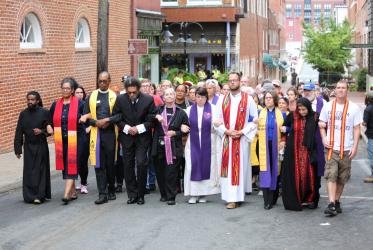By Marion Unger*
In the small village of Kaliki, men, women and children are on their feet, dancing, accompanied by drum rolls, as an international World Council of Churches (WCC) Pilgrim Team arrives. The pilgrims are given intricately-woven crowns of grass and flowers and their faces are painted with traditional patterns. The ceremony, which takes place in silence, culminates in a poetic new name for the visitors: "offspring of the betel nut.”
The pilgrimage to Kaliki is one touched with adventure. It takes three hours to drive from Merauke, in Papua, Indonesia, through the flat landscape, where one rice paddy is aligned with next. The trip goes briskly until the Pilgrim Team is about five kilometers from the village, when the cars sink into the mud and need an hour to cover the short remaining distance. After the extremely warm welcome, Mateus Kaeze, the village chief, soberly describes the situation of the indigenous Papuans who live here.
Just before the village of Kaliki the road sinks into the mud.
He lists their serious problems briefly and succinctly: land grabbing, environmental destruction, lack of access to health care and education, and hunger. "Our forests are being damaged and are increasingly disappearing," he says. "But nature is our livelihood and we are responsible for protecting it.”

The WCC delegation is received ceremoniously in the village of Kaliki with traditional customs
He is also concerned about education for the children and, finally, completion of the road to the village. His words contain no blame, but at the end there is an urgent appeal for assistance to the WCC delegation. And not least for his own church, the GKI TP: eleven years ago the construction of a church began but there is no money to finish it.
George Pelasula, who accompanies the delegation, is also outspoken. He is a pastor in Baidub, a community of 46 families spread over two villages. "We are trapped between two palm oil plantations," says Pelasula. "The forest was cut down for them." Each of the plantations spans over one hundred hectares; one of them is operated by a company from Malaysia.” The other belongs to a national Indonesian political appointee, the pastor explains.
Kaliki has been building his church since eleven years – but there is no money to finish it.
His parishioners are hunters and gatherers. Before the palm oil industry interfered in their lives, they cultivated sandalwood and processed crocodile skin into bags. The flour of sago palms was their most important staple food. Then companies bought their land at bargain basement prices.
"People do not even know what they are signing when a contract is presented to them," says Pelasula. “The sellers do not even receive a copy of the contract. How can they take legal action against suspected fraud?”
Pastor George Pelasula (3rd from left) does his best to take the pastoral care of the congregation and fight the depressive mood in the community.
This is why they can be recruited to clear the forest and work in the factories for extremely low wages. The multinational corporations are building an agribusiness and eco-fuel production center in Kaliki, and operate palm oil plantations in Baidub. They make use of an oppressive system of intimidation and promises that are not kept. Tribal elders receive gifts to make people submissive, promised schools are not built and - the hardest thing - people are strictly forbidden to enter the forest.
"Our forest is not a forest, it is a political issue," says Pastor Jimmy Sormin of the Communion of Churches in Indonesia. The prohibition law dates back to the reign of dictator Suharto, who summarily claimed the forest as state property. Hunting is no longer permitted there, and fishing is forbidden in any case because the rivers and lakes are heavily polluted or even poisoned by waste water from the factories.
Indigenous Papuans are seeing their chances for a life in dignity dwindle. They worry about the future of their children. If there is a school in their village, there is a shortage of teachers, who are civil servants.
"Some children cannot write and read even after six years of primary school,” Pelasula says. No wonder, he concludes, that a profound depression has been spreading among the indigenous Papuans for years.
Pelasula faces its consequences day after day as he struggles as a pastor against increasing domestic violence among his parishioners. He notes, "They are simply desperate and do not know what to do with their anger."
*Marion Unger works as a freelance journalist based in Germany
Racism, climate change and economic justice in the spotlight of WCC international affairs meeting in Indonesia (WCC press release 27 February 2019)
Papua human rights situation, religious freedom, focuses of WCC delegation visit to Indonesia (WCC press release 25 February 2019)










